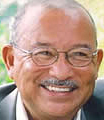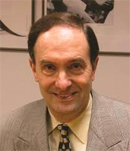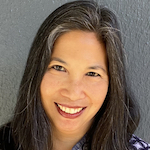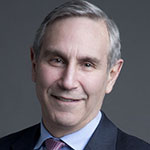Delbert Spurlock, a lawyer who was EVP of the New York Daily News from 1993-2010, has joined the PRSA/NY “Mock Trial” of PR Monday as a press advocate.
 |
Spurlock, who was general counsel of the U.S. Army from 1980-83 and then assistant secretary to 1989, founded the e-learning firm Alcel in Reston, Va., in 2010. He is a 1972 grad of George Washington University Law School and was in the Spurlock & Thatch law firm in Sacramento, until 1980.
He was recruited for the panel by Emmanuel Tchividjian, chief ethics officer of Ruder Finn and a member of national’s Ethics Board. A longtime friend of Tchividjian, Spurlock was sought as a potential prosecution witness representing the journalism community since the panel was top-heavy with PR people.
Another late addition to rectify this imbalance is Fran Hawthorne, author of Ethical Chic -- An Investigation of Starbucks, Apple (and others), who is an ardent supporter of unions.
 |
The panelists will consider -- in a webcast available in "real time" -- the charge that "PR professionals practice deception; are not transparent, and do not offer a valuable service to their clients or to society."
Webcast Available Nationally
Link to the nationally-available webcast is livestream.com/sunyglobalcenter. It will become active just before the start of the 6:30 p.m. program.
Other panelists are Randy Cohen, ex-New York Times “Ethicist” columnist; Jacqueline Brevard, ex-ethics officer of Merck; Michael Schubert, Ruder Finn; Steve Cody, Peppercomm; Douglas Simon, D S Simon Productions, and Paul Holmes, The Holmes Report.
The “jury” will consist of the audience. Reporters, initially banned, will be allowed at the session although they can’t ask questions during the program. They may speak to the panelists before and after the session which runs from 6:30 p.m. to 8 p.m at the SUNY Global Center, 166 E. 55th st.
Here’s Topics for the Panel
A danger of this kind of program is that generalizations will be batted around and specific topics will be avoided. Panelists will “wing it,” speak “off the tops of their heads.” No one will have any documents to present. Specific examples of ethical abuses will be dodged.
We are sending this column, with links to relevant documents, to panelists for whom we have e-mails. E-mails of some of the panelists are either not available or the panelists do not respond—symptomatic of what is going on in PR and reporting.
Since SUNY is doing a webcast of the program, there is a recording of it and a transcript should be made available. PR’s as well as reporters don’t have time to view 90 minutes of talk. A transcript is the efficient way to find out what happened. Transcripts of the PRSA Assembly, as well as the audio, were made available until 2005.
Ideally, the panel, now weighted with more liberal-leaning elements, should come up with a series of resolutions for righting ethical wrongs in both PR and journalism.
It should tackle ethical issues that are specific to the PR industry as well as PR’s use on the international scene.
One resolution we would seek is that PR people be required to respond to phone calls and e-mails of reporters even if they cannot make any comment.
Imbalance of Press, PR Contacts Is Issue
A PR-specific issue, especially since Cision is one of the sponsors, is the vast imbalance in contact points of PR people and reporters.
PR people have at their fingertips ways of reaching hundreds of thousands of editors indexed many ways, via e-mail, phone, snail mail and messenger services.
No such convenient databases are available to newspeople who might want to query PR people by industry, size or location. Membership lists of PR groups are closely guarded although they used to be public.
Reporters who approach companies and institutions are apt to run into a wall of PR “underlings” who block the way, as New York Times columnist Dave Carr has noted.
“The modern chief executive lives behind a wall of communications operatives, many of whom ladle out slop meant to obscure rather than reveal,” he wrote. “Reporters have to work their way past background conversations with underlings, written statements that say nothing, and that increasingly hardy perennial: the ‘no comment.’”
What panelists might do is recommend that groups like PRSA, IABC, Arthur W. Page Society, PR Seminar, National Investor Relations Institute, Publicity Clubs in New York and Chicago, etc., open their lists to reporters. That would help to level the playing field.
Reporters are bombarded by pitches from Cision and another sponsor of this event, PR Newswire. Our “quarantined” e-mail is usually far over the 1,000 mark and even more pitches from them are in a “junk mail” category. It’s time for PR people to get “back in the swim” and stop being prima donnas.
Since this is a PR Society event and Tchividjian, a member of the national Ethics Board is conducting it, panelists should look at whether the Society is engaging in any sort of deception. It’s supposed to be practicing at the highest possible ethical level in order to set a good example.
Panelists are being e-mailed our articles on the Society’s financial statements which a CPA says fail to properly reflect net assets since dues are booked as cash rather than as a deferred liability. This is a violation of Section 958-605-25-1 of the Financial Accounting Standards Board.
Other concrete topics that need discussion are the PR surrounding the just-ended Israel/Gaza battle and Russia’s incursions in Ukraine.
Russia's behavior has put Ketchum on the spot, according to reports in NYT and elsewhere.
Massive PR efforts are now taking place on the issue of whether and what war crimes may have been committed in the just ended battle of the people of Gaza and Israel.
Prime Minister Benjamin Netanyahu spelled out Israel’s position in a nearly hour-long interview with Fox Newscaster Sean Hannity Aug. 7. The link contains a 5,126-word transcript.
Fairness & Accuracy in Media questioned the objectivity of U.S. media in reporting on the conflict. A 13-page article in the Sept. 1 New Yorker explored the influence of the American Israel Public Affairs Committee on the U.S. Congress.
The panel should look at the communications of both sides and judge whether the high standards of the Society’s Code are being followed including promises of “fair dealing” and “protecting and advancing the free flow of accurate and truthful information.”


 Helga Ying, who is in charge of International AIDS Society’s offices in San Francisco and Oakland, is moving to Edelman as global and US chair of Purpose.
Helga Ying, who is in charge of International AIDS Society’s offices in San Francisco and Oakland, is moving to Edelman as global and US chair of Purpose.  Emmanuel Tchividijian, who was senior VP/chief ethics officer at Ruder Finn in a 20-year stint, has established
Emmanuel Tchividijian, who was senior VP/chief ethics officer at Ruder Finn in a 20-year stint, has established  Every profession needs codes of conduct to help ensure the credible performance of its members. The public relations profession has several codes aimed at building and sustaining positive behavior but none of them addresses how practitioners must write for PR and related business purposes. (3 reader comments)
Every profession needs codes of conduct to help ensure the credible performance of its members. The public relations profession has several codes aimed at building and sustaining positive behavior but none of them addresses how practitioners must write for PR and related business purposes. (3 reader comments) Workplace diversity Issues, ranging from race to gender, have long been high profile threats to the brand. Ageism has been the exception - until now. (2 reader comments)
Workplace diversity Issues, ranging from race to gender, have long been high profile threats to the brand. Ageism has been the exception - until now. (2 reader comments) There's a battle for truth, in which people no longer share common facts and are unable to have a rational debate, Richard Edelman said during his speech at USC Annenberg School of Communication and Journalism on April 12. (1 reader comment)
There's a battle for truth, in which people no longer share common facts and are unable to have a rational debate, Richard Edelman said during his speech at USC Annenberg School of Communication and Journalism on April 12. (1 reader comment)


 Have a comment? Send it to
Have a comment? Send it to 
No comments have been submitted for this story yet.